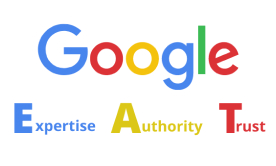
How to Improve Website SEO to Drive High-Quality Business Leads
While search engines are famous for their regular algorithm changes, one thing’s crystal clear – search engine optimisation (SEO) is here to stay. It’s an essential part of the marketing mix. If you know how to improve website SEO, you’re already one step ahead of the game. If you don’t, now is the perfect time to learn. And as it’s an ever-evolving beast, staying on top of the latest trends and strategies is vital to ongoing success.
SEO can be overwhelming to get started with it. Most marketers have a certain degree of understanding, but not many know the full picture. To make it as easy as possible to get to grips with different elements of SEO, we’ve structured this article with clear (and clickable) sections so you can navigate to the most relevant information.

So, dive straight in or jump to the relevant section - the choice is yours!
The growing need for an SEO-friendly business website
How digital lead generation and SEO go hand-in-hand
How to improve website SEO: The fundamentals
Why SEO is so important in Financial Services
SEO is changing - how can you keep up?
The latest SEO trends your business needs to know about
What are the best tools/platforms to help you improve your website SEO?
Some quick-win SEO strategies to boost your performance
Does your business need an SEO agency?
How Inbound FinTech can help you to improve website SEO
Summary
The growing need for an SEO-friendly business website
When discussing how to improve website SEO, we’ll cover technical, on-page and off-page SEO.
If you’re not familiar with these terms, technical SEO is everything that goes into ensuring that your website runs smoothly. This includes UX and UI, page speed, security, mobile-friendliness and other technical aspects that impact your rankings and send signals to search engines. On-page SEO is the other side of the coin – all the content that goes on your website pages, keyword optimisation and all the work that goes into creating it and ensuring it meets the standards expected of Google’s content evaluators.
Without a solid technical foundation, even the best SEO strategies will struggle to deliver results. While if your content isn’t deemed trustworthy or valuable to the reader, it will not deliver the desired traffic or results.
Off-page SEO is about the work done outside your website that drives visitors back to it, such as outreach and backlinking strategies. We’ll touch on this later in this guide.

How digital lead generation and SEO go hand-in-hand
Although digital spaces are becoming increasingly crowded, SEO remains one of the best ways to attract high-quality leads to your business. Leads from search engines have a 14.6% close rate compared to outbound leads (cold-calling, direct mail, etc.) close rate of only 1.7%.
Unlike other digital lead generation methods, SEO continues to add value long after the core work is done. Once a piece of content goes live, its potential for reaching people grows. Over time, people will share and link to your articles. And as you publish more content, you will rank better for your target keywords. This is known as “evergreen content”.
As you improve your website SEO, you’ll find that it becomes one of the highest-performing entry points for business lead generation. It’s no wonder why – you’re ultimately giving your audience the power to find you and your content on their terms, with the right search intent.
How to improve website SEO: The fundamentals
Without the right fundamentals, even the best SEO strategies can underperform. To avoid this, you must build solid foundations for your website content. Let’s explore a few considerations for how to improve your website SEO.
Identify your target audience and its interests
Target audience research is the key to a successful SEO strategy. This should be the foundation of your approach to creating compelling content that attracts the right people to your site and helps them along the buyer’s journey.
Start by defining and building persona profiles for your ideal customers. Once you’ve identified your buyer personas, scope out their needs, interests and challenges. Armed with these insights, you can start shaping your SEO strategy and planning content that addresses their goals and pain points.
This ties into the inbound marketing approach that focuses on creating relevant content for ideal customers at each stage of the buyer’s journey. Learn more about the inbound methodology.
Understand your customer journey
Even if you’re new to SEO, some customers are likely to have already found your website through organic search. If you have any analytics software installed, start by analysing the data you’ve already gathered to determine their navigational patterns. Combine this data with insights from your Sales team to define the paths you want to send website visitors on.
This will help you devise a content plan aligned with your keyword research and mapped to the customer journey.
Leverage your competitor and audience research to identify keywords
A successful keyword strategy is data-driven. You need to:
- Understand your key personas
- Define their needs and pain points
- Carry out keyword research around these and establish the keyword
- Search questions that your personas are most likely to use to find the solution to their problem, the answer to their query or the product/service for their desired job/task
The first part will become clearer once you’ve developed your target personas. For the latter, you may find valuable insights among your competitors. Find out what keywords they’re ranking for and reverse engineer potential search queries you can target. Plus, a keyword gap analysis will help you see what content you have that’s relevant for the topics and search queries identified as a priority and the gaps on your website where you’re not providing content to help your personas.
Find out about the SEO tools that can support your research.
Trust the process
One thing to remember about improving your website SEO is that it’s not an instant process. You can get some quick wins (we’ll discuss this later), but they won’t guarantee sustainable growth. When you build your SEO strategy and foundation, don’t rush into creating content that aims to convert. Instead, focus on the top levels of your funnel first and take a more targeted approach as you grow your content hub.
Why SEO is so important in Financial Services
SEO for Financial Services marketing is a highly competitive and dynamic space. New start-ups pop up daily and try to carve out a space for themselves in search results.
Learn more in our blog about the importance of SEO in Financial Services marketing.
Marketers in the Financial Services sector must realise that online growth comes through strategic and ongoing SEO work. As you look into how to improve your website SEO, you will find that the relevance and quality of your content are key factors for growth. With an average of 6.8 stakeholders involved in the B2B buying process (and 8.2 contacts involved in deals), you need decision-makers to find your website when searching for solutions and for your content to be helpful and compelling when they arrive on your key pages. Plus, offer easy ways for them to navigate to further information on your site as they move through the buyer’s journey.
To generate high-quality leads, you must aim to establish your business as a thought leader in the financial services industry. Moreover, the content you create should be tailored to the needs and interests of your target personas. With this in mind, keep track of the top SEO trends and leverage them in your Financial Services SEO strategies.
SEO is changing - how can you keep up?
To improve website SEO, create powerful content that helps your target personas find solutions to their queries. Google’s latest algorithm updates focus on more than just keywords. To help users navigate busy online spaces like the Financial Services industry, Google content evaluators focus on quality and relevance as a top priority for ranking content. There are criteria that evaluators use, which is known as E-A-T. Find out more about this in our next section.
You’ll need to keep track of your competitors’ strategies and follow the latest industry updates to stay on top of the latest SEO trends. It might sound overwhelming, but as you learn how to improve your website SEO, you’ll build your knowledge and skills.
The latest SEO trends your business needs to know about
As you mentioned, the field of search engine optimisation is continually evolving and adapting to changes in technology, search behaviours and algorithm updates. We’ve highlighted some of the latest SEO trends you need to keep track of to ensure you’re taking the right approach to improve your website performance.
Create targeted content based on data
With Google making quality a priority for SEO, reflecting the needs of your target personas in your content is a must. When your website content revolves around your audience’s pain points, you will see better results in both your rankings and conversion rates.
Start by researching your audience and find out their search intent for key queries you’d like to target. Once you’ve gathered enough information, you can create content with a clear purpose to satisfy your target personas’ needs.
Keywords are not everything
Your research should cover more than just the queries you’d like to target. Keywords are essential, but so is the intent – do searchers want to buy, investigate or compare services? Understanding this will help you approach content strategically and outline paths for your visitors to follow.
Keep track of AI and algorithm SEO trends
As a marketer, you’re probably already aware of new technologies entering the digital space at a fast pace. Bear that in mind when putting together your SEO strategy. You’ll need to stay up to date with the latest tech trends. Keep an eye out for things like AI and smart devices that are changing how search engines generate results. Voice search and predictive technology already play a part in search algorithms and their importance will grow.

Create in-depth content
Products and services that are complicated to understand need content that covers more than just the highlights. The Financial Services industry is a great example of this, as it deals with complex concepts that people may not know much about.
To help your visitors navigate complex information, you can break it down into a series of pieces on a certain topic. Once you have all the separate articles, you can create a long-form guide and link to the relevant content you’ve already published.
Using video as a part of your content strategy
Creating video content can help businesses simplify and explain complex ideas. Moreover, it allows marketers to harness the power of YouTube’s very own search engine and reach new audiences. Video is a format that many users actively look for, and video search results have a 41% higher click-through rate (CTR) than text-based results, so it’s one to keep track of among other top SEO trends.
Learn more about video SEO in Wistia’s Guide to Video Marketing.
It's all about quality for Google
Key factors that Google evaluates content by include purpose, quality and detail. While the amount and purpose of content are relatively straightforward, quality may feel subjective. But Google’s content evaluation framework is known as E-A-T (expertise, authoritativeness, and trustworthiness). EAT considers how often the information on a page is updated, who its author is and how qualified they are to offer expertise on a subject.
Additionally, Financial Services companies need to pay extra attention to YMYL (your money, your life) pages. They are pages that can impact financial decisions, so their quality and relevance are a priority for SEO.
Adding structure with pillar pages and topic clusters
Using pillar pages and topic clusters is one of the best ways to add hierarchy to your content and help website visitors follow a distinct path. Pillar pages are long-form content pieces that cover a topic in depth. They link to smaller topic cluster pieces about different aspects of the main topic and help marketers create a powerful internal linking structure. Pillar pages can also help Financial Services companies establish themselves as thought leaders and attract leads through multiple search queries.
Find out more about pillar pages and topic clusters in our blog on the Proven Inbound Marketing Strategies Financial Companies Are Using to Grow.

Website health and optimisation
Website health is a prerequisite for all top SEO strategies. Businesses should ensure their websites are safe, quick and easy to navigate if they want their pages to rank highly.
Mobile optimisation is also a priority - almost half of the web traffic in the UK comes from mobile devices. So, ensure your site content renders well on all devices and screen sizes and delivers a good browsing experience.
Google emphasises the importance of these factors and introduced its Core Web Vitals update to measure them back in 2020. The three key metrics are:
- Largest Contentful Paint (LCP) - measuring loading performance
- First Input Delay (FID) - measuring interactivity
- Cumulative Layout Shift (CLS) - measuring visual stability
Marketers should work with a trusted web development team to ensure your website meets Google’s standards.
Don’t forget about backlinks
Backlinks are an essential part of successful long-term SEO strategies. Having high-authority websites link to you is one of the best ways to climb the rankings. You need to be strategic in planning your outreach strategy. Use email templates you can quickly send to potential backlink opportunities.
The growing influence and impact of backlinks are clear. A sophisticated backlinking strategy can take your SEO efforts to the next level.
Check out our article about the 10 Top SEO Trends FinTech Companies Need to Know About for more SEO industry news and insights.
What are the best tools/platforms to help you improve your website SEO?
Search engine optimisation is complicated, but the good news is you don’t have to do it all on your own. Nowadays, there are more SEO tools than you can count, each designed to help marketers improve website performance. It’s not easy to choose the best tool for your needs, so we’ve highlighted some of our favourites below.
SEMRush
Not many tools are better suited to improving your website SEO than SEMrush. It’s a comprehensive platform that offers a wide range of features and insights. Some of our favourite SEMRush features are the Site Health Audit, Keyword Magic and Backlink Analysis tools. They help you paint a well-rounded picture of issues and determine SEO goals and strategies.

Moz
The platform offers Moz Pro, an SEO tool that helps businesses optimise their inbound marketing. It specialises in link building and site audits and will alert you when there are any errors in your website’s structure. One of the best things about Moz is its one-month free trial. It’s a great way to explore the platform before making any commitments.
AHREFS
Another popular all-in-one tool is AHREFS. It offers users a range of functionalities and ways to improve SEO and develop top SEO strategies. It provides site audits, keyword research, and Rank Tracker and Content Explorer tools. The interface is easy to understand and navigate, allowing anyone to get up to speed with SEO.
Screaming Frog
Another favourite of top SEO agencies, mainly due to Screaming Frog’s powerful tool, the SEO Spider. This website crawler extracts data and audits your site looking for common issues. Best of all, you can crawl 500 URLs for free, so if you have a small website, the free version might be all you need.
Hotjar
Although it’s not necessarily an SEO tool, Hotjar helps marketers understand how visitors interact with their website. You can use it to optimise user journeys and site hierarchy, which are powerful ranking factors for search engine optimisation.
Yoast SEO
WordPress plugin Yoast SEO is one of the most popular SEO tools in the world. It allows users to optimise their pages for specific keywords and improve the readability score of their content. Yoast SEO also simplifies creating sitemaps and non-crawlable pages so marketers can have greater control of technical SEO without coding knowledge.
IFT Website Grader
Our Website Grader is a simple tool that analyses the important areas of your website’s SEO. It provides the user with an overall performance score and a list of recommendations for improvements.
The grader enables you to:
- Analyse website performance
- Get on-demand support
- Improve website issues
- Optimise for mobile
- Boost website security
- Optimise user experience
You can use our Website Grader now and see how your website is performing!
Google Search Console
Marketers use Google Search Console to monitor and control how websites get discovered on Google. It’s an SEO must-have and offers features like keyword and content analysis and a link checker tool that helps you spot broken links.
Google Analytics
This well-known tool helps businesses understand how their websites are performing and where. Based on these insights, you can optimise pages and plan your next SEO steps. It also offers great reporting features, which can help you analyse engagement and understand which channels drive conversions.
There is a range of SEO features to take advantage of, and many with free versions. Once you combine the data the tool provides with your understanding of your audience, your SEO strategies will start taking shape. However, due to changing rules around privacy and consent, Google Analytics will soon be superseded by GA4.
Because of the growing complexity around data usage and privacy laws, Google has introduced the more flexible GA4 solution to help businesses measure many different kinds of data, across their customers’ multi-platform user journeys. Designed with privacy at its core, GA4 does not rely exclusively on cookies, no longer stores IP addresses and uses an event-based data model to deliver user-centric measurement, giving businesses a strong analytics experience that’s designed for the future.
Some other useful SEO tools worth mentioning are Woorank,
Google My Business (a must for local SEO), Ubersuggests and GT Metrix.
Some quick-win SEO strategies to boost your performance
SEO is a long-term strategy that needs to be monitored and updated, and it can take months to deliver substantial results. But for all the impatient marketers out there, we have good news. You can implement quick-win strategies to boost performance and start ranking well without waiting months. We’ve highlighted some of the top SEO strategies to help you quickly boost your website SEO below.

Optimise your images and visual content
Images are a vital part of your website and your SEO. If not optimised, they can slow down a website and harm the user experience. As page speed is a ranking factor for Google, you need to ensure all the images on your website are optimised. A few steps to take are resizing large images, serving next-gen formats (WebP, JPEG 2000, JPEG XR), and using a plugin to compress image sizes.
Also, you need to add and optimise filenames and alt text, to incorporate focus keywords and signal to search engines what the image reflects. Apply this to your video content too - there are options to add descriptions, titles and tags, etc. This helps to demonstrate the purpose of the content to crawlers.
Repurpose relevant content
Repurposing your content is a no-brainer. Not only will it save you time and money, but it can help boost your SEO quickly. You can use your blog content to create infographics, videos and even podcasts. Or slice and dice long-form content, like ebook guides, interviews or podcasts, into shorter articles or pieces of content that focus on more specific subtopics.
Another thing to consider is updating older pieces of content with new data and more timely stats, sources and internal links. You should also optimise them for relevant keywords identified in your strategy, where possible.
Add FAQ Schema to pages
FAQ Schema is one of the top SEO trends. It’s a markup you can add to your website’s code on relevant pages. It contains a list of questions and answers, which allow Google to crawl your website and use it as a rich snippet. Many websites can qualify for it without restructuring much of the code, which makes it a great quick win for businesses.
Schema, in general, is a key part of your website’s technical setup. It is structured data that sends signals to search engines about the type of pages on your site. Learn more about Schema and how it works.
Find ‘low-hanging fruit’ keywords
Low-hanging fruit keywords are those that your competitors are already ranking for but for which you could easily create better content and gain an advantage. To find these keywords, research what competitors are ranking for and identify weak points. From there on, all you need to do is create better content based on the insights you’ve gathered.
It may sound too simple but sometimes pages only rank due to a lack of better alternatives. If you create this alternative and do it well, you’ll quickly take over your competitors’ rankings.
Add internal links to new and existing content and pages
Internal linking is becoming one of the most important ranking factors for website SEO. It allows Google to crawl pages quicker and understand your page hierarchy and navigational flow. Additionally, by using internal links from high-ranking pages, you can boost the ranking of new pages - transferring the link juice. Another key benefit is that it keeps users on your website longer and can lead them down specific paths, meaning a lower bounce rate and greater opportunities for conversions.
Does your business need an SEO agency?
Now that you know a bit more about how to improve website SEO, you might be wondering whether you need to hire a digital agency to support your strategy. Some marketers prefer to do it all in-house, but unfortunately, you can’t always have in-depth expertise in every aspect of marketing or the resources dedicated to driving ongoing results and success. Hiring an experienced SEO agency can be a great solution.
One of the biggest signs that you need professional SEO services is feeling stuck and lacking direction. You may already know all the latest trends but structuring them into a strategy is another story. An experienced SEO agency will help you draw a clear path to success and work with you to develop a comprehensive strategy.

What services should you expect from a top SEO agency?
Your goals and situation will determine the service you need from an SEO agency. If you already have a website that’s not been updated for a while or isn’t regularly monitored, you may want an in-depth technical SEO report and advice on priorities and actions to improve performance.
If you’re just starting, you’ll need advice on building a proper page structure and implementing strong technical SEO to ensure your website is set up the right way. Starting fresh with an SEO agency is one of the best ways to guarantee success. They can help you build the right foundations from the get-go.
You also may want to look for ongoing SEO services to continue growing and moving your pages and content up the search rankings. Monthly reporting and audits are a great way to track progress and ensure your website is healthy and secure. In addition to reporting, a dedicated agency can help you plan the right content and campaigns to drive more organic leads to your business.
Questions to ask
prospective SEO agencies
Even with this knowledge, finding the right SEO agency for your needs can be a challenge. It’s not always easy to understand if the agency’s services are the right fit for you. Here are a few questions you should ask prospective providers:
- Have you worked with businesses in our industry?
- Can you display examples of past results?
- What can we keep in-house and what can we outsource?
- What metrics do you use to track progress?
- What reports will we be receiving?
- Which SEO tools do you use?
- Do you need admin privileges to our website? What for?
- What on-page and off-page SEO factors do you consider?
How Inbound FinTech can help you to improve website SEO
If you’re looking into how to improve your website SEO, the best way to achieve results is to find an agency with proven expertise in your industry. At Inbound FinTech, we’ve worked with a wide range of Financial Services clients to help them increase their organic traffic and drive high-quality leads.
With the help of our experienced SEO experts, you can discover how well your website is performing and fix any issues that may be setting you back. Moreover, various services will help you climb the rankings and attract your target audience to your website content, across the buyer’s journey.
Here are just some of the search engine optimisation services we offer:
- Comprehensive SEO audits
- SEO gap analysis
- In-depth technical SEO reports
- SEO best practice recommendations
- Quick-win SEO strategies
- Technical SEO fixes/improvements
- Keyword research & website optimisation plan
- SEO roadmap for inbound marketing campaigns
- Ongoing SEO support
- Outreach & backlink strategy
- SEO monitoring tools and support
- Topic cluster and pillar pages development and implementation
- Monthly SEO ranking reports
Explore our SEO services and how Inbound FinTech can help transform your website performance.
SEO Services
for FinTech & FSI Companies
Ensure your best content is seen by your ideal customers with Inbound FinTech’s expert SEO services
Summary
Hopefully, by now, you have a better perspective on how to improve your website SEO. Most importantly, you know that results won’t happen overnight. You need to keep working on it to achieve lasting results. Remember, you don’t have to be an expert in every marketing discipline – outsourcing SEO requirements and support to a specialist agency might be the best solution for your business.
How to improve website SEO: Recap of the key takeaways
- Make sure your website is quick, accessible and easy to navigate
- Use top digital tools to find any technical issues and implement improvements
- Research your audience and identify target personas
- Plan keywords and content that will answer your target personas’ questions and address their needs and pain points
- Create high-quality content that displays your EAT (expertise, authoritativeness and trustworthiness)
- Dedicate resources to on-page, off-page and technical SEO
- Keep up with the latest SEO trends to ensure you don’t lose ground on your competitors


ABOUT US
How we do things at IFT
At Inbound FinTech (IFT), we specialise in digital services and support for businesses in the Financial Services sector to help them optimise their website for organic search and lead generation. IFT is an award-winning digital growth agency based in London with a global team of experts. Our knowledge and experience in the industry, coupled with our SEO expertise, help us provide a solution tailored to the needs of our clients.
If you think you’re ready to take the next step on your SEO journey, browse our SEO services page. And don’t hesitate to get in touch with us with any questions or to discuss a potential project.
Learn more


%20(3).png)






























